China Arts & Entertainment
Yu Hua’s Surprising Transformation from Renowned Avant-Garde Writer to Beloved “Scruffy Pup”
Yu Hua’s rise as an online celebrity highlights that Chinese youth value relatability and likability over literary prestige.
Published
1 year agoon
By
Ruixin Zhang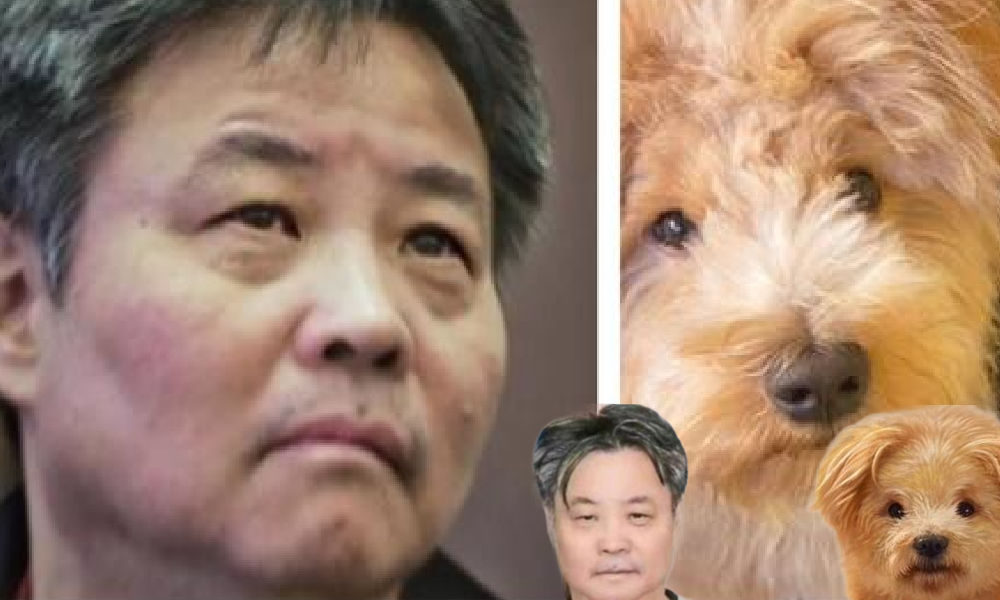
On Chinese social media, Yu Hua has transcended his status as one of China’s most renowned contemporary writers. Surrounded by memes, online jokes, and fans born after 2000, he has emerged as a cultural icon for China’s younger generations.
Not long ago, mentioning Yu Hua (余华) would bring to mind an avant-garde writer known for his literary exploration of human suffering. Recently, however, Yu Hua’s name on the Chinese internet and social media is more and more associated with memes, jokes, and the “scruffy pup” (潦草小狗).
Born in 1960, Yu Hua emerged as one of the renowned Chinese young writers of the later 1980s and 1990s who became known for their avant-garde fiction. Since 1983, Yu has come out with many stories and (short) novels. His most renowned works include the novels To Live (活着, 1993) and Chronicle of a Blood Merchant (许三观卖血记, 1995). His work was translated in many languages and he became the first Chinese writer to receive the James Joyce Award in 2002. Yu Hua recently celebrated the 40th anniversary of his literary debut.
In early 2022, Yu Hua, who seemed to have moved beyond the peak of his writing career, returned to the limelight at a book launch event. However, the focus was not on his own new book but on Fatigue of Life and Death (生死疲劳) by his friend, fellow Chinese author, and Nobel laureate Mo Yan (莫言).
Yu Hua was invited to the event as a guest but attracted attention for how he expressed his admiration for Mo Yan (莫言), using no less than three swear words in a row, basically voicing how “f*cking good” he thought Mo Yan’s work is (“牛逼”, “妈的”, “我操”). The moment went viral as many netizens appreciated how Yu Hua, such an established author, swore like any other enthusiastic ordinary person. He was suddenly very relatable.
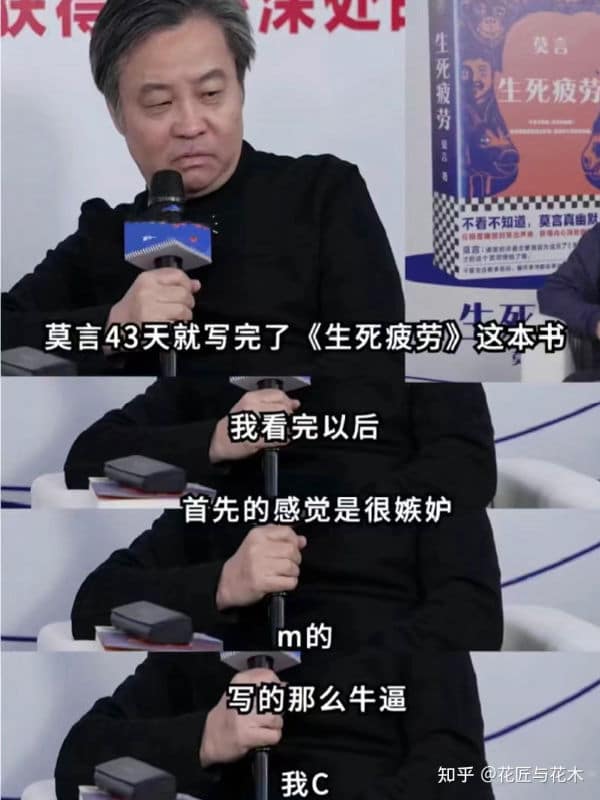
The incident led people to explore Yu Hua’s past, finding more examples of his special, down-to-earth kind of humor. Such as when he revealed that people would often mistake him for Mo Yan and how he had gotten use to signing his own name inside Mo Yan’s books.
Another time, Yu Hua casually talked about his author friend Shi Tiesheng (史铁生), who became wheelchair-bound after an accident at 21, and how he made an excellent goalkeeper during football games among writers.
Reflecting on his first day of work, he once humorously shared that he arrived two hours late, only to discover he was the first one there, saying, “It was a sign I’d found the perfect job.”
This kind of light-hearted humor that goes against the grain seems to resonate with Chinese youth, especially at a time when they are facing various social pressures and a growing youth unemployment crisis. Terms like “involution” (nèijuǎn, 内卷), “ugly tired” (lèichǒu, 累丑), and “lying flat” (tǎng píng, 躺平) underscore a sense of collective pessimism.
Many find it refreshing to see a literary master like Yu Hua breaking down his own image and authority and connect with today’s younger generations by going against traditional values. One popular blogger (@十两欢) even referred to Yu Hua as a “therapy for the youth” (“年轻人安抚师”).
As Yu was getting increasingly popular online, a viral video in 2022 compared him to a cute yet somewhat confused dog, with the video suggesting Yu Hua actually looks just like this dog. This led to him being dubbed “the scruffy pup.”
“I’m sorry, Teacher Yu Hua,” the vlogger wrote: “I genuinely love your work and I mean no disrespect, but you [and my dog] really do like look alike.”

The scruffy pup meme.
Over the past two years, the “scruffy pup” meme has become part of Yu Hua’s online popularity. From Weibo to Bilibili and Xiaohonghu, people comment on his literary work and share inspirational quotes, while also making fun of his personality and relatable approach to life.
One viral gif shows Yu Hua seemingly bored and glassy-eyed during book signing, with many commenters replying that the look in his eyes captures exactly how they feel while at work or school.
Yu Hua himself has indicated that he embraces the ‘scruffy pup’ comparison, though he did clarify that he’s actually a “scruffy dog wearing a suit.”
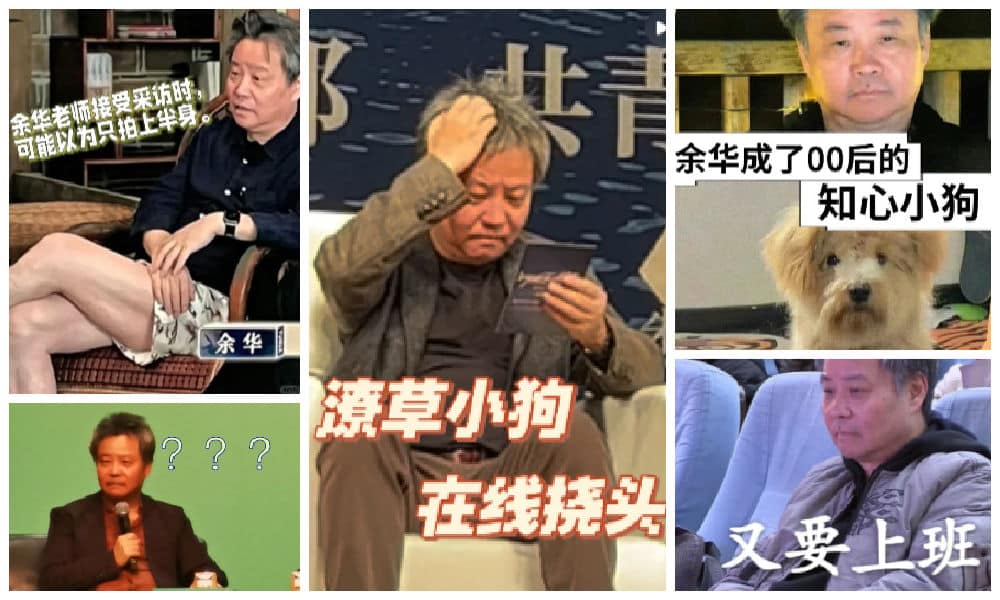
Some of the memes and funny images about Yu Hua (screenshots via Xiaohonghu by Whatsonweibo).
Yu Hua’s newfound status as a cultural icon for China’s youth is not just visible on social media, it is also visible offline. During his book signing events in Hong Kong and South Korea in 2023, fans reserved all nearby hotel rooms. Some enthusiasts even came prepared with sleeping bags and tents, ensuring they queued up early to secure a chance to meet their idol.
Yu’s popularity is part of a broader trend of Chinese older literary figures becoming part of online youth culture. As recently highlighted by He Qitong at Sixth Tone, both Yu Hua and Mo Yan are examples of literary household names in China who have recently reached online celebrity status after their humorous takes on modern living and literature began to circulate on social media. Their appearances on popular TV shows like “I Read Books on an Island” (我在岛上读书) have further boosted their popularity.
In spring of 2023, Mo Yan went viral for disclosing that he had struggled to create a suitable speech for Yu Hua during the 65th anniversary celebration of the Chinese literary magazine Shouhuo in Shanghai. The Nobel laureate, one of China’s greatest modern-day writers, therefore admitted he had received in help in eventually writing the speech with ChatGPT.
The way Chinese young people are now writing and joking about established writers such as Yu Hua and Mo Yan shows a huge difference from the way people engaged with scholars and literary figures in earlier years. With the rise of social media, netizens were eager to gain knowledge and wisdom from well-known intellectuals, excited about how the internet provided new ways to ask questions and learn from them.
Today’s post-00 generation isn’t primarily seeking profound insights from their literary icons but is rather looking for relatability and likeability. In the case of Yu Hua the scruffy dog’, it is evident that many have found that humor and grounded observations about daily life are the strongest bridges connecting two different generations and the spheres of China’s avant-garde authors and Gen Z social media users.
By Ruixin Zhang and Manya Koetse
Get the story behind the hashtag. Subscribe to What’s on Weibo here to receive our newsletter and get access to our latest articles:
Spotted a mistake or want to add something? Please let us know in comments below or email us. First-time commenters, please be patient – we will have to manually approve your comment before it appears.
©2023 Whatsonweibo. All rights reserved. Do not reproduce our content without permission – you can contact us at info@whatsonweibo.com.
Ruixin is a Leiden University graduate, specializing in China and Tibetan Studies. As a cultural researcher familiar with both sides of the 'firewall', she enjoys explaining the complexities of the Chinese internet to others.

You may like
China Memes & Viral
How Ne Zha 2’s Shen Gongbao Became Known as the Ultimate “Small-Town Swot”
Published
1 week agoon
March 1, 2025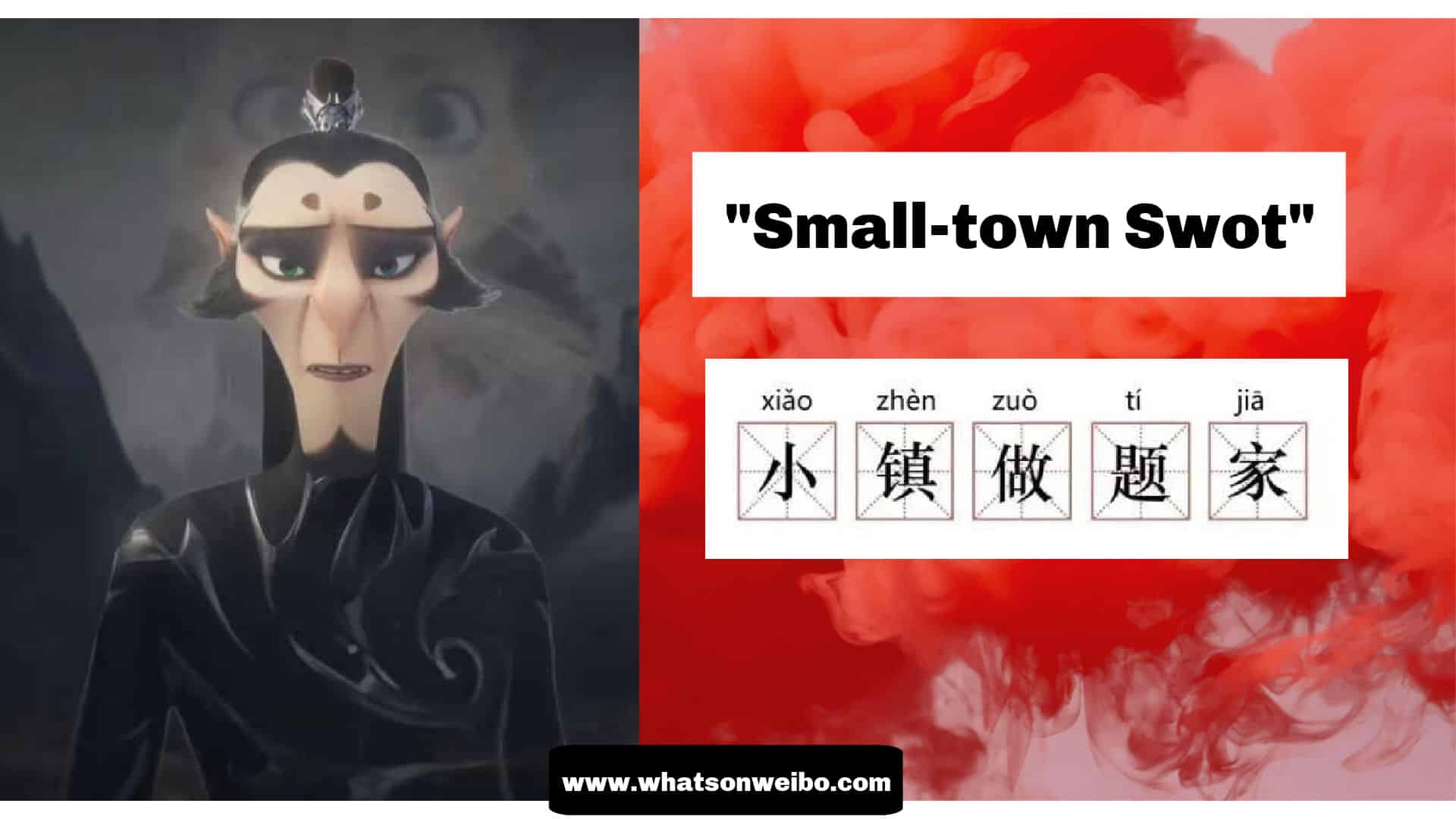
PART OF THIS TEXT COMES FROM THE WEIBO WATCH PREMIUM NEWSLETTER
Over the past few weeks, the Chinese blockbuster Ne Zha 2 has been trending on Weibo every single day. The movie, loosely based on Chinese mythology and the Chinese canonical novel Investiture of the Gods (封神演义), has triggered all kinds of memes and discussions on Chinese social media (read more here and here).
One of the most beloved characters is the leopard demon Shen Gongbao (申公豹). While Shen Gongbao was a more typical villain in the first film, the narrative of Ne Zha 2 adds more nuance and complexity to his character. By exploring his struggles, the film makes him more relatable and sympathetic.
In the movie, Shen is portrayed as a sometimes sinister and tragic villain with humorous and likeable traits. He has a stutter, and a deep desire to earn recognition. Unlike many celestial figures in the film, Shen Gongbao was not born into privilege and never became immortal. As a demon who ascended to the divine court, he remains at the lower rungs of the hierarchy in Chinese mythology. He is a hardworking overachiever who perhaps turned into a villain due to being treated unfairly.
Many viewers resonate with him because, despite his diligence, he will never be like the gods and immortals around him. Many Chinese netizens suggest that Shen Gongbao represents the experience of many “small-town swots” (xiǎozhèn zuòtíjiā 小镇做题家) in China.
“Small-town swot” is a buzzword that has appeared on Chinese social media over the past few years. According to Baike, it first popped up on a Douban forum dedicated to discussing the struggles of students from China’s top universities. Although the term has been part of social media language since 2020, it has recently come back into the spotlight due to Shen Gongbao.
“Small-town swot” refers to students from rural areas and small towns in China who put in immense effort to secure a place at a top university and move to bigger cities. While they may excel academically, even ranking as top scorers, they often find they lack the same social advantages, connections, and networking opportunities as their urban peers.
The idea that they remain at a disadvantage despite working so hard leads to frustration and anxiety—it seems they will never truly escape their background. In a way, it reflects a deeper aspect of China’s rural-urban divide.
Some people on Weibo, like Chinese documentary director and blogger Bianren Guowei (@汴人郭威), try to translate Shen Gongbao’s legendary narrative to a modern Chinese immigrant situation, and imagine that in today’s China, he’d be the guy who trusts in his hard work and intelligence to get into a prestigious school, pass the TOEFL, obtain a green card, and then work in Silicon Valley or on Wall Street. Meanwhile, as a filial son and good brother, he’d save up his “celestial pills” (US dollars) to send home to his family.
Another popular blogger (@痴史) wrote:
“I just finished watching Ne Zha and my wife asked me, why do so many people sympathize with Shen Gongbao? I said, I’ll give you an example to make you understand. Shen Gongbao spent years painstakingly accumulating just six immortal pills (xiāndān 仙丹), while the celestial beings could have 9,000 in their hand just like that.
It’s like saving up money from scatch for years just to buy a gold bracelet, only to realize that the trash bins of the rich people are made of gold, and even the wires in their homes are made of gold. It’s like working tirelessly for years to save up 60,000 yuan ($8230), while someone else can effortlessly pull out 90 million ($12.3 million).In the Heavenly Palace, a single meal costs more than an ordinary person’s lifetime earnings.
Shen Gongbao seems to be his father’s pride, he’s a role model to his little brother, and he’s the hope of his entire village. Yet, despite all his diligence and effort, in the celestial realm, he’s nothing more than a marginal figure. Shen Gongbao is not a villain, he is just the epitome of all of us ordinary people. It is because he represents the state of most of us normal people, that he receives so much empathy.”
In the end, in the eyes of many, Shen Gongbao is the ultimate small-town swot. As a result, he has temporarily become China’s most beloved villain.
By Manya Koetse, with contributions by Wendy Huang
Follow @whatsonweibo
Spotted a mistake or want to add something? Please let us know in comments below or email us. Please note that your comment below will need to be manually approved if you’re a first-time poster here.
©2025 Whatsonweibo. All rights reserved. Do not reproduce our content without permission – you can contact us at info@whatsonweibo.com
China ACG Culture
Beyond the Box Office: What’s Behind Ne Zha 2’s Success?
The impact of Ne Zha 2 goes beyond box office figures—yet, in the end, it’s the numbers that matter most.
Published
2 weeks agoon
February 27, 2025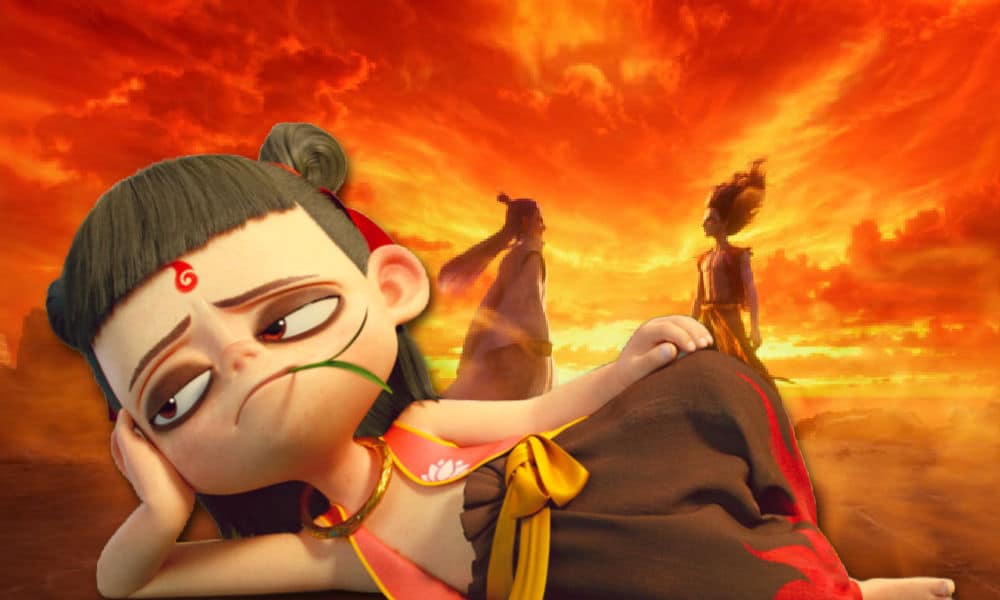
FROM THE WEIBO WATCH PREMIUM NEWSLETTER
These days, everybody is talking about Ne Zha 2 (哪吒2:魔童闹海), the recent hit film about one of China’s most legendary mythological heroes. With its spectacular visuals, epic battles, funny characters, dragons and deities, and moving scenes, the Chinese blockbuster animation is breaking all kinds of records and has gone from the major hit of this year’s Spring Festival film season to the 7th highest-grossing movie of all time and, with its 13.8 billion yuan ($1.90 billion USD) box office success, now also holds the title of the most successful animated film ever worldwide.
But there is so much more behind this movie than box office numbers alone. There is a collective online celebration surrounding the film, involving state media, brands, and netizens. On Weibo, a hashtag about the movie crossing the 10 billion yuan ($1.38 billion) milestone (#哪吒2破100亿#) has been viewed over a billion times. Social media timelines are filled with fan art, memes, industry discussions, and box office predictions.
The success of Ne Zha 2 is not just a win for China’s animation industry but for “Made in China” productions as a whole. Some argue that Ne Zha‘s triumph is not just cultural but also political, reinforcing China’s influence on the global stage and tying it to the ongoing US-China rivalry: after growing its power in military strength, technology, and AI, China is now making strides in cultural influence as well.
In a recent Weibo post, state broadcaster CCTV also suggested that Hollywood has lost its monopoly over the film industry and should no longer count on the Chinese market—the world’s second-largest movie market—for its box office dominance.
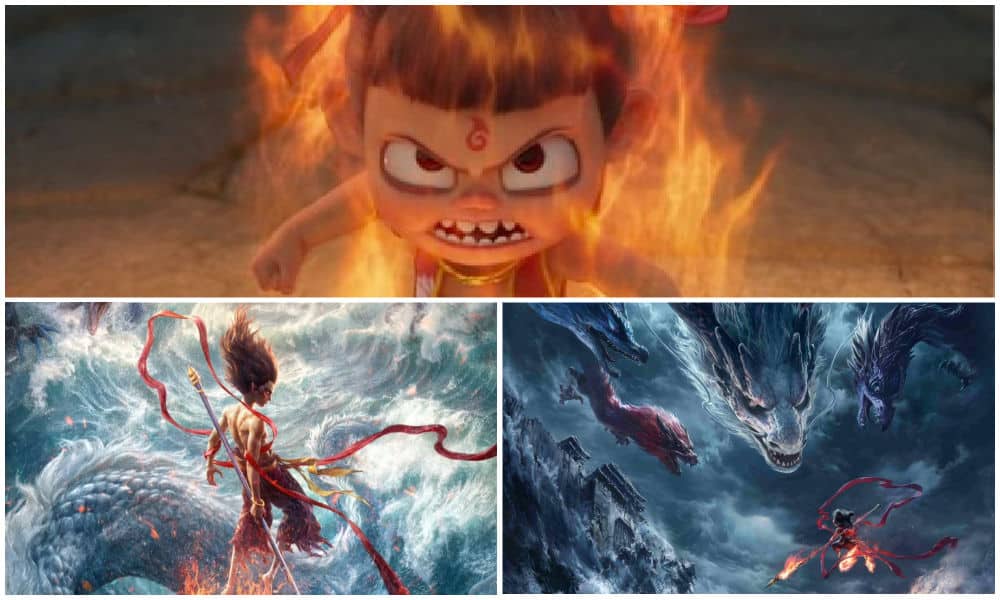
Various images from “Ne Zha 2” 哪吒2:魔童闹海
The success of Ne Zha 2 mainly resonates so deeply because of the past failures and struggles of Chinese animation (donghua 动画). For years, China’s animation industry struggled to compete with American animation studios and Japanese anime, while calls grew louder to find a uniquely Chinese recipe for success—to make donghua great again.
🔹 The Chinese Animation Dream
A year ago, another animated film was released in China—and you probably never heard of it. That film was Ba Jie (八戒之天蓬下界), a production that embraced Chinese mythology through the story of Zhu Bajie, the half-human, half-pig figure from the 16th-century classic Journey to the West (西游记). Ba Jie was a blend of traditional Chinese cultural elements with modern animation techniques, and was seen as a potential success for the 2024 Spring Festival box office race. It took eight years to go from script to screen.
But it flopped.
The film faced numerous setbacks, including significant production delays in the Covid years, limited showtime slots in cinemas, and, most importantly, a very cold reception from the public. On Douban, China’s biggest film review platform, many top comments criticized the movie’s unpolished animation and special effects, and complained that this film—like many before it—was yet another Chinese animation retelling a repetitive story from Journey to the West, one of the most popular works of fiction in China.
“Another mythological character, the same old story,” some wrote. “We’re not falling for low-quality films like this anymore.”
The frustration wasn’t just about Ba Jie—it was about China’s animation industry as a whole. Over the past decade, the quality of Chinese animation films has become a much-discussed topic on social media in China—sometimes sparked by flops, and other times by hits.
Besides Ba Jie, one of those flops was the 2018 The King of Football (足球王者), which took approximately 60 million yuan ($8.8 million) to make, but only made 1.8 million yuan ($267,000) at the box office.
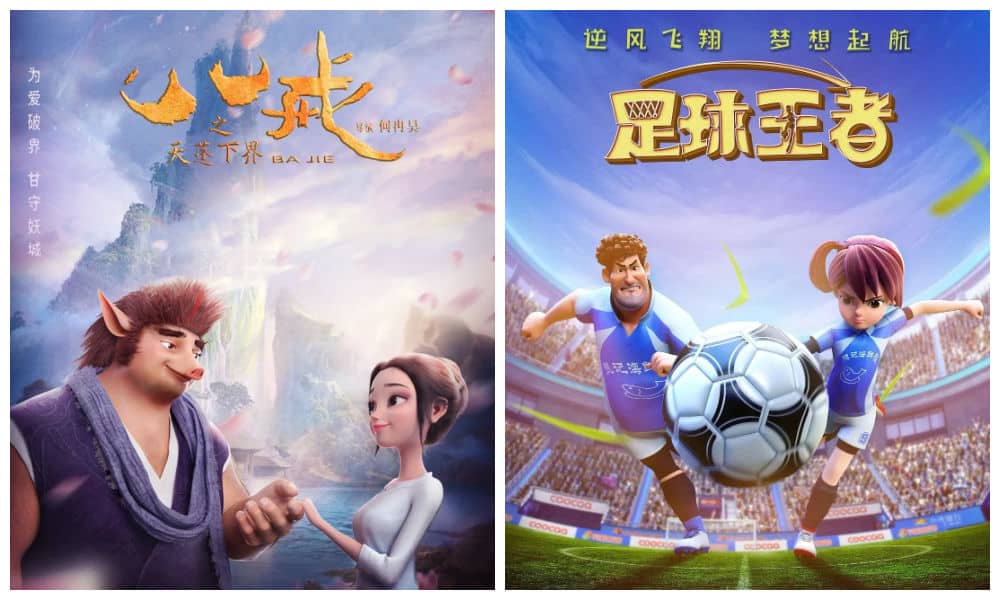
Both Ba Jie, which took years to reach the screen, and King of Football, a high-budget animation, ended up as flops.
One of those successes was the 2019 first Ne Zha film (哪吒之魔童降世), which became China’s highest grossing animated film, or, of the same year, the fantasy animation White Snake (白蛇:缘起), a co-production between Warner Bros and Beijing-based Light Chaser Animation (also the company behind the Ne Zha films). These hits
showed the capabilities and appeal of made-in-China donghua, and sparked conversations about how big changes might be on the horizon for China’s animation industry.
“The only reason Chinese people don’t know we can do this kind of quality film is because we haven’t made any good stories or good films yet,” White Snake filmmaker Zhao Ji (赵霁) said at the time: “We have the power to make this kind of quality film, but we need more opportunities.”
More than just entertainment, China’s animated films—whether successes or failures—have come to symbolize the country’s creative capability. Over the years, and especially since the widespread propagation of the Chinese Dream (中国梦)—which emphasizes national rejuvenation and collective success—China’s ability to produce high-quality donghua with a strong cultural and artistic identity has become increasingly tied to narratives of national pride and soft power. A Chinese animation dream took shape.
🔹 The “Revival” of China’s Animation Industry
A key part of China’s animation dream is to create a 2.0 version of the “golden age” of Chinese animation.
This high-performing era, which took place between 1956 and 1965, was led by the Shanghai Animation Film Studio. While China’s leading animators were originally inspired by American animation (including Disney’s 1937 Snow White and the Seven Dwarfs), as well as German and Russian styles, they were committed to developing a distinctly Chinese animation style—one that incorporated classical Chinese literature, ink painting, symbolism, folk art, and even Peking opera.
Some of the most iconic films from this era include The Conceited General (骄傲的将军, 1956), Why Crows Are Black (乌鸦为什么是黑的, 1956), and most notably, Havoc in Heaven (大闹天宫, 1961 & 1964). Focusing on the legendary Monkey King, Sun Wukong (孙悟空), Havoc in Heaven remains one of China’s most celebrated animated films. On Douban, users have hailed it as “the pride of our domestic animation.”
One of China’s most renowned animation masters, Te Wei (特伟), once explained that the flourishing of China’s animation industry during this golden era was made possible by state support, a free creative atmosphere, a thriving production system, and multiple generations of animators working together at the studio.
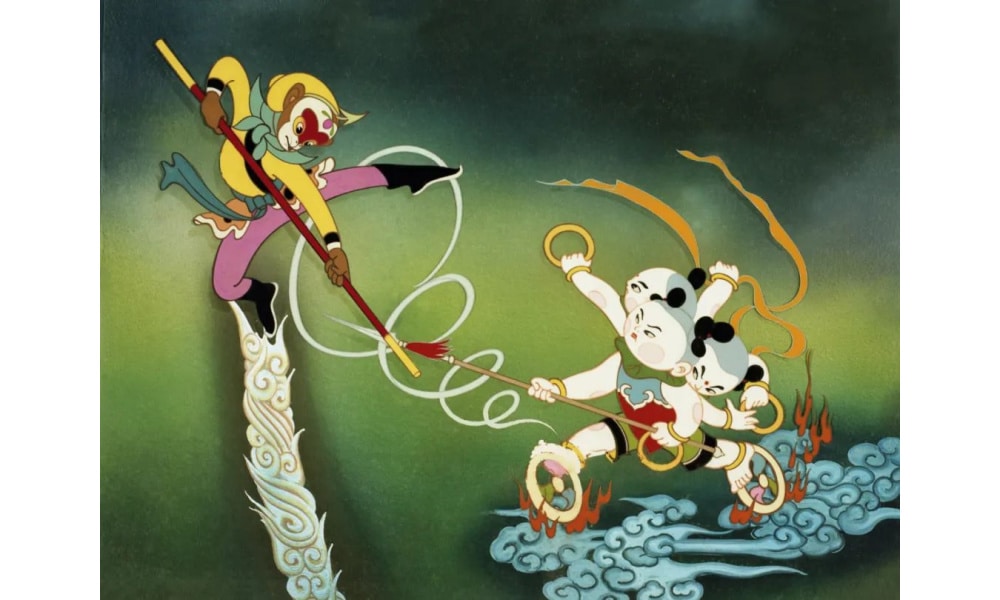
Still from Havoc in Heaven 大闹天宫 via The Paper.
➡️ So what happened to the golden days of Chinese animation?
The decline of this golden era was partly due to the political turmoil of the Cultural Revolution (1966–1976). While there was a second wave of successful productions in the late 1970s and 1980s, the industry lost much of its ‘magic touch’ in the 1990s and 2000s. During this period, Chinese animation studios were pressured to prioritize commercial value, adhere to strict content guidelines, and speed up production to serve the rising domestic TV market—while also taking on outsourcing work for overseas productions.
As the quality and originality of domestic productions lagged behind, the market came to be dominated by imported (often pirated) foreign animations. Japanese series like Astro Boy, Doraemon, and Chibi Maruko-chan became hugely influential among Chinese youth in the 1990s. The strong reaction in China to the 2024 death of Japanese manga artist Akira Toriyama, creator of Dragon Ball, also highlighted the profound impact of Japanese animation on the Chinese market.
This foreign influence also changed viewers’ preferences and aesthetic standards, and many Chinese animations adopted more Japanese or American styles in their creations.
However, this foreign ‘cultural invasion’ was not welcomed by Chinese authorities. As early as 1995, President Jiang Zemin reminded the Shanghai Animation Film Studio of the ideological importance of animation, emphasizing that China needed its “own animated heroes” to serve as “friends and examples” for Chinese youth.
By the early 2010s, the revitalization and protection of China’s animation industry became a national priority. This was implemented through various policies and incentives, including government funding, tax reductions and exemptions for Chinese animation companies, national animation awards, stipulations for the number of broadcasted animations that must be China-made. Additionally, there was an increased emphasis on animation as a tool for cultural diplomacy, focusing on how Chinese animation should reflect national values and history while maintaining global appeal.
It’s important to note that the so-called ‘rejuvenation’ of Chinese animation is not just a cultural and ideological project, there are economic motives at stake too: China’s animation industry is a multi-billion dollar industry.
🔹 “Are We Ne Zha or the Groundhogs?”
The huge success of Ne Zha 2 is seen as a new milestone for Chinese animation and as inspiration for audiences. The film took about five years to complete, reportedly involving 140 animation studios and over 4,000 staff members. The film was written and overseen by director Yang Yu (杨宇), better known as Jiaozi (饺子).
The story is all based on Chinese mythology, following the tumultuous journey of legendary figures Nezha (哪吒) and Ao Bing (敖丙), both characters from the 16th-century classic Chinese novel Investiture of the Gods (Fengshen Yanyi, 封神演义). Unlike Ba Jie or other similar films, the narrative is not considered repetitive or cliché, as Ne Zha 2 incorporates various original interpretations and detailed character designs, even showcasing multiple Chinese dialects, including Sichuan, Tianjin, and Shandong dialects.
One of the film’s unexpected highlights is its clan of comical groundhogs. In this particularly popular scene, Nezha engages in battle against a group of groundhogs (土拨鼠), led by their chief marmot (voiced by director Jiaozi himself). Amid the fierce conflict, most of the groundhogs are hilariously indifferent to the fight itself; instead, they are focused on protecting their soup bowls and continuing to eat—until they are ultimately hunted down and captured.
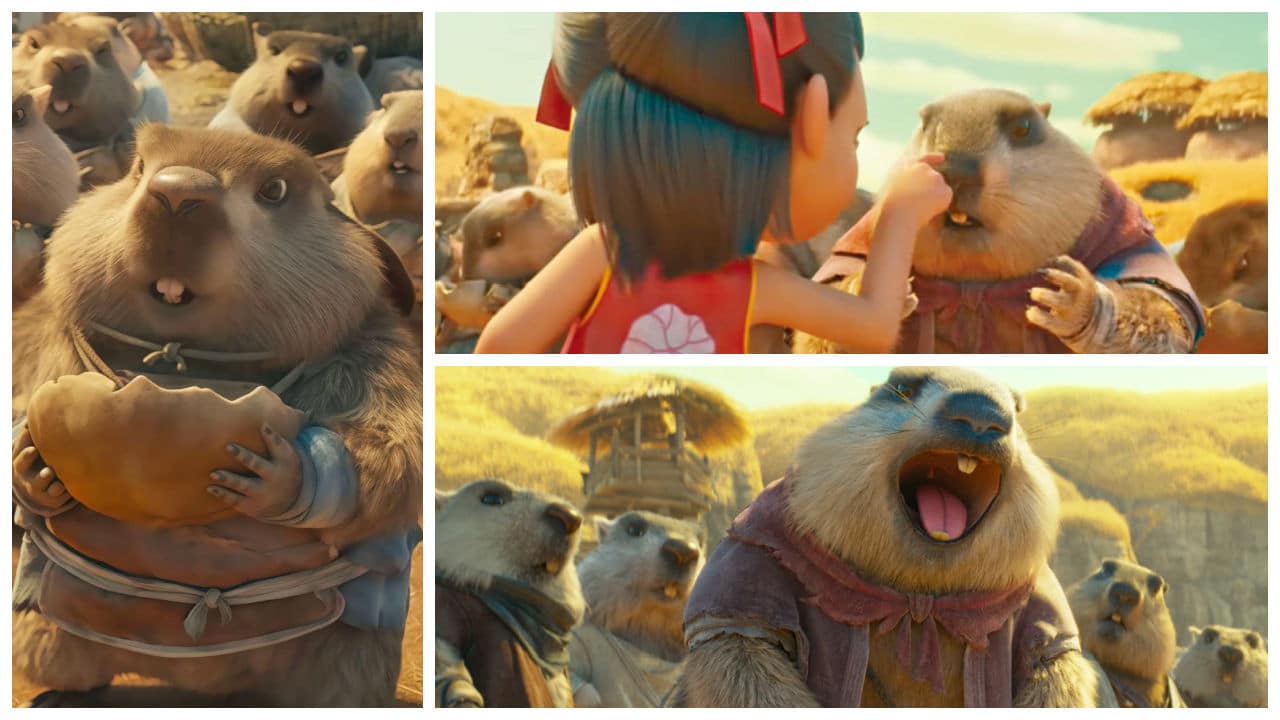
Nezha and the clan of groundhogs.
Besides fueling the social media meme machine, the groundhog scene actually also sparked discussions about social class and struggle. Some commentators began asking, “Are we Ne Zha or the groundhogs?”
Several blogs, including this one, argued that while many Chinese netizens like to identify with Nezha, they are actually more like the groundhogs; they don’t have powerful connections nor super talents. Instead, they are hardworking, ordinary beings, struggling to survive as background figures, positioned at the bottom of the hierarchy.
One comment from a film review captured this sentiment: “At first, I thought I was Nezha—turns out, I’m just a groundhog” (“开局我以为自己是哪咤,结果我是土拨鼠”).
The critical comparisons between Nezha and the groundhogs became politically sensitive when a now-censored article by the WeChat account Fifth Two-Six District (第五二六区) suggested that many Chinese people are so caught in their own information bubbles and mental frameworks that they fail to grasp how the rest of the world operates. The article said: “The greatest irony is that many people think they are Nezha—when in reality, they’re not even the groundhogs.”
While some see a parallel between Nezha’s struggles and their own hardships, others interpret the film’s success as a symbol of China’s rise on the global stage—particularly because the story is so deeply rooted in Chinese culture, literature, and mythology. This has led to an alternative perspective: rather than remaining powerless like the groundhogs, perhaps China—and its people—are transforming into the strong and rebellious Nezha, taking control of their destiny and rising as a global force.
Far-fetched or not, it’s an idea that continues to surface online, along with many other detailed analyses of the film. The nationalist Chinese social media blogger “A Bad Potato” (@一个坏土豆) recently wrote in a Weibo post:
“We were once the groundhog, but today, nobody can make us kneel!” (“我们曾经是土拨鼠,但是今天,没有任何人可以让我们跪下!”)
In another post, the blogger even dragged the Russia-Ukraine war into the discussion, arguing that caring too much about the powerless “groundhogs,” those struggling to survive, does not serve China’s interest. He wrote:
“(..) whether Russia is righteous or evil does not concern me at all. I only care about whether it benefits our great rejuvenation—whoever serves our interests, I support. Only the “traitors” speak hypocritically about love and justice. Speaking about freedom and democracy that we don’t even understand, they wish Russia collapses tomorrow but don’t care if that would lead to us being surrounded by NATO. So, in the end—are we Ne Zha, or are we the groundhog?”
One line from the film that has gained widespread popularity is: “If there is no path ahead, I will carve one out myself!” (“若前方无路,我就踏出一条路!”). Unlike the more controversial groundhog symbolism, this phrase resonates with many as a reflection not only of Nezha’s resilience but also of the determination that has been driving China’s animation industry forward.
The story of Ne Zha 2 goes beyond box office numbers—it represents the global success of Chinese animation, a revival of its golden era, and China’s growing cultural influence. Yet, paradoxically, it’s also all about the numbers. While the vast majority of its earnings come from the domestic market, Ne Zha 2 is still officially a global number-one hit. More than its actual reach worldwide, what truly matters in the eyes of many is that a Chinese animation has managed to surpass the US and Japan at the box office.
While the industry still has room to grow and many markets to conquer, this milestone proves that part of the Chinese animation dream has already come true. And with Ne Zha 3 set for release in 2028, the journey is far from over.
Want to read more on Ne Zha 2? Also check out the Ne Zha 2 buzz article by Wendy Huang here and our related Weibo word of the week here.
By Manya Koetse
(follow on X, LinkedIn, or Instagram)
Some of the research referenced in this text can also be found in an article I published in 2019: The Chinese Animation Dream: Making Made-in-China ‘Donghua’ Great Again. For further reading, see:
►Du, Daisy Yan. 2019. Animated Encounters: Transnational Movements of Chinese Animation, 1940s-1970s. Honolulu: University of Hawaii Press.
►Lent, John A. and Xu Ying. 2013. “Chinese Animation: A Historical and Contemporary Analysis.” Journal of Asian Pacific Communication 23(1): 19-40.
►Saito, Asako P. 2017. “Moe and Internet Memes: The Resistance and Accommodation of Japanese Popular Culture in China.” Cultural Studies Review 23(1), 136-150.
🌟 Attention!
For 11 years, What’s on Weibo has remained a fully independent platform, driven by my passion and the dedication of a small team to provide a window into China’s digital culture and online trends. In 2023, we introduced a soft paywall to ensure the site’s sustainability. I’m incredibly grateful to our loyal readers who have subscribed since then—your support has been invaluable.
But to keep What’s on Weibo thriving, we need more subscribers. If you appreciate our content and value independent China research, please consider subscribing. Your support makes all the difference.
Spotted a mistake or want to add something? Please let us know in comments below or email us. First-time commenters, please be patient – we will have to manually approve your comment before it appears.
©2025 Whatsonweibo. All rights reserved. Do not reproduce our content without permission – you can contact us at info@whatsonweibo.com.
What’s on Weibo Chapters
Subscribe

Five Trending Proposals at the Two Sessions 🔍

US-Russia Rapprochement and “Saint Zelensky”: Chinese Online Reactions to Trump’s Shake-Up

“Li Jingjing Was Here”: Chinese Netizens React to Rumors of “Chinese Soldiers” in Russian Army

How Ne Zha 2’s Shen Gongbao Became Known as the Ultimate “Small-Town Swot”

Beyond the Box Office: What’s Behind Ne Zha 2’s Success?

Our Picks: Top 10 Chinese Buzzwords and Phrases of 2024 Explained

“Dear Li Hua”: The TikTok/Xiaohongshu Honeymoon Explained

Why Chinese Hit Movie “Her Story” is ‘Good Stuff’: Stirring Controversy and Celebrating Female Perspectives

Chiung Yao’s Suicide Farewell Letter: An English Translation

12-Year-Old Girl from Shandong Gets Infected with HPV: Viral Case Exposes Failures in Protecting Minors

Weibo Watch: Christmas in China Is Everywhere and Nowhere

Breaking the Taboo: China’s Sanitary Pad Controversy Sparks Demand for Change

Weibo Watch: A New Chapter

Story of Chinese Female MA Graduate Going Missing for 13 Years Sparks Online Storm

Weibo Watch: China’s Online Feminism Is Everywhere
Get in touch
Would you like to become a contributor, or do you have any tips or suggestions? Get in touch here!
Popular Reads
-

 China Insight10 months ago
China Insight10 months agoThe Tragic Story of “Fat Cat”: How a Chinese Gamer’s Suicide Went Viral
-

 China Music11 months ago
China Music11 months agoThe Chinese Viral TikTok Song Explained (No, It’s Not About Samsung)
-

 China Digital9 months ago
China Digital9 months agoChina’s 2024 Gaokao Triggers Online Discussions on AI
-

 China Arts & Entertainment10 months ago
China Arts & Entertainment10 months agoSinging Competition or Patriotic Fight? Hunan TV’s ‘Singer 2024’ Stirs Nationalistic Sentiments






